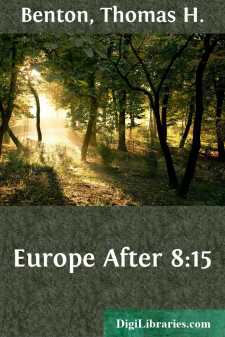Categories
- Antiques & Collectibles 13
- Architecture 36
- Art 48
- Bibles 22
- Biography & Autobiography 813
- Body, Mind & Spirit 142
- Business & Economics 28
- Children's Books 15
- Children's Fiction 12
- Computers 4
- Cooking 94
- Crafts & Hobbies 4
- Drama 346
- Education 46
- Family & Relationships 57
- Fiction 11828
- Games 19
- Gardening 17
- Health & Fitness 34
- History 1377
- House & Home 1
- Humor 147
- Juvenile Fiction 1873
- Juvenile Nonfiction 202
- Language Arts & Disciplines 88
- Law 16
- Literary Collections 686
- Literary Criticism 179
- Mathematics 13
- Medical 41
- Music 40
- Nature 179
- Non-Classifiable 1768
- Performing Arts 7
- Periodicals 1453
- Philosophy 64
- Photography 2
- Poetry 896
- Political Science 203
- Psychology 42
- Reference 154
- Religion 513
- Science 126
- Self-Help 84
- Social Science 81
- Sports & Recreation 34
- Study Aids 3
- Technology & Engineering 59
- Transportation 23
- Travel 463
- True Crime 29
Europe After 8:15
by: Thomas H. Benton
Description:
Excerpt
PREFACE IN THE SOCRATIC MANNER
"Nothing broadens and mellows the mind so much as foreign travel."—Dr. Orison Swett Marden.
The scene is the brow of the Hungerberg at Innsbruck. It is the half-hour before sunset, and the whole lovely valley of the Inn—still wie die Nacht, tief wie das Meer—begins to glow with mauves and apple greens, apricots and silvery blues. Along the peaks of the great snowy mountains which shut it in, as if from the folly and misery of the world, there are touches of piercing primary colours—red, yellow, violet—the palette of a synchromist. Far below, hugging the winding river, lies little Innsbruck, with its checkerboard parks and Christmas garden villas. A battalion of Austrian soldiers, drilling in the Exerzierplatz, appears as an army of grey ants, now barely visible. Somewhere to the left, beyond the broad flank of the Hungerberg, the night train for Venice labours toward the town.
It is a superbly beautiful scene, perhaps the most beautiful in all Europe. It has colour, dignity, repose. The Alps here come down a bit and so increase their spell. They are not the harsh precipices of Switzerland, nor the too charming stage mountains of Northern Italy, but rolling billows of clouds and snow, the high-flung waves of some titanic but stricken ocean. Now and then comes a faint clank of metal from the funicular railway, but the tracks themselves are hidden among the trees of the lower slopes. The tinkle of an angelus bell (or maybe it is only a sheep bell) is heard from afar. A great bird, an eagle or a falcon, sweeps across the crystal spaces.
Here where we are is a shelf on the mountainside, and the hand of man has converted it into a terrace. To the rear, clinging to the mountain, is an Alpine gasthaus—a bit overdone, perhaps, with its red-framed windows and elaborate fretwork, but still genuinely of the Alps. Along the front of the terrace, protecting sightseers from the sheer drop of a thousand feet, is a stout wooden rail.
A man in an American sack suit, with a bowler hat on his head, lounges against this rail. His elbows rest upon it, his legs are crossed in the fashion of a figure four, and his face is buried in the red book of Herr Baedeker. It is the volume on Southern Germany, and he is reading the list of Munich hotels. Now and then he stops to mark one with a pencil, which he wets at his lips each time. While he is thus engaged, another man comes ambling along the terrace, apparently from the direction of the funicular railway station. He, too, carries a red book. It is Baedeker on Austria-Hungary. After gaping around him a bit, this second man approaches the rail near the other and leans his elbows upon it. Presently he takes a package of chewing gum from his coat pocket, selects two pieces, puts them into his mouth and begins to chew. Then he spits idly into space, idly but homerically, a truly stupendous expectoration, a staggering discharge from the Alps to the first shelf of the Lombard plain! The first man, startled by the report, glances up....


